- Home
- Lynne Reid Banks
The Fairy Rebel
The Fairy Rebel Read online
For more than forty years,
Yearling has been the leading name
in classic and award-winning literature
for young readers.
Yearling books feature children’s
favorite authors and characters,
providing dynamic stories of adventure,
humor, history, mystery, and fantasy.
Trust Yearling paperbacks to entertain,
inspire, and promote the love of reading
in all children.
OTHER YEARLING BOOKS YOU WILL ENJOY
THE FARTHEST-AWAY MOUNTAIN
Lynne Reid Banks
I, HOUDINI:
THE AUTOBIOGRAPHY OF A
SELF-EDUCATED HAMSTER, Lynne Reid Banks
CHARLOTTE’S ROSE, A. E. Cannon
QUIT IT, Marcia Byalick
SPRING-HEELED JACK, Philip Pullman
THE UNSEEN, Zilpha Keatley Snyder
RODZINA, Karen Cushman
TADPOLE, Ruth White
MIDWINTER NIGHTINGALE, Joan Aiken
Published by Yearling, an imprint of Random House Children’s Books a division of Random House, Inc., New York
Copyright © 1985 by Lynne Reid Banks
Illustrations copyright © 1985 by J. M. Dent & Sons Ltd
All rights reserved. No part of this book may be reproduced or transmitted in any form or by any means, electronic or mechanical, including photocopying, recording, or by any information storage and retrieval system, without the written permission of the publisher, except where permitted by law. For information address Delacorte Press.
Yearling and the jumping horse design are registered trademarks of Random House, Inc.
Visit us on the Web! www.randomhouse.com/kids
Educators and librarians, for a variety of teaching tools, visit us at www.randomhouse.com/teachers
eISBN: 978-0-307-78681-4
v3.1
For “Bindi” and her mother
CONTENTS
Cover
Other Yearling Books You Will Enjoy
Title Page
Copyright
Dedication
Part One
1 EARTHED
2 PETALS AND FEATHERS
3 THE FUNNY FEELING
4 SNOW ON A RED ROSE
5 THE QUEEN’S RULES
6 THE WASPS’ NEST
7 SUGAR TEARS
Part Two
1 THE BLUE TUFT
2 ROSE-PRESENTS
3 THE DRIED-UP TWIG
4 THE NECKLACE
5 MORE TOYS!
6 THE TYRANT QUEEN
7 THE MAGIC RINGS
8 THE GREAT GATHERING
Part One
1
Earthed
If you happen to go to school just outside London, you might find yourself sitting next to a girl called Bindi. If you do, perhaps you think she is perfectly ordinary. She has brown hair and hazel eyes and is a little bit plump—not fat, mind you, just nicely chubby (though she gets teased a lot about it). She looks and dresses and talks the same as anyone else.
But I am going to tell you why she’s not really ordinary at all.
The story starts quite a few years ago. To understand it, you have to know a little about her mother and father.
Her father’s name is Charlie, and he’s a doctor. Not a surgeon, the kind who does operations, but a GP—the kind who comes to visit you when you’re ill. Her mother, Jan, is an actress—and not just any old actress. She would never tell you so, but she was once a star.
That was when she was younger. She was small for her age, and very beautiful. She could sing, and dance. She played young girls’ parts on the stage, in films and on television. Everyone said she had a wonderful future.
But then something awful happened.
One day she was acting in a television studio when a heavy lamp fell on her. She was in the hospital for a long, long time, and when she came out—although she was still beautiful and still talented—she couldn’t walk properly. She had a bad limp.
So she decided she couldn’t really act anymore. She couldn’t bear people to see her limp and feel sorry for her.
One good thing came out of her accident, though. While she was getting better she met Charlie, and they fell in love and got married. They bought a small house with a lovely garden, which had fruit trees in it. Jan loved trees. She also loved sweet things to eat. She loved them too much in a way, because now that she couldn’t get much exercise, she began to put on weight. Soon, instead of being slim, she was rather roly-poly. But she still had a lovely voice, and long dark hair, and beautiful eyes.
When Charlie looked into her eyes, he could see a lot of hurt in them. He wished Jan would talk about this, but she never would. She could still act, and she acted being perfectly happy. She could walk quite well enough to look after the little house and do the cooking and mess about in the garden.
Shopping was a problem at first. But Charlie had a talk to one of the local shopkeepers. After that, Jan would ring him up and tell him what she wanted, and later the same day, a boy on a bicycle—with a special metal basket in front—would bring all her shopping to her in a cardboard box. No one ever told Jan where the bicycle had come from. Charlie had bought it.
So things went on for a year or two. But then the hurt in Jan’s eyes began to get worse. Charlie understood why.
“Stop worrying,” he told her. “The accident only damaged your leg. There’s no reason on earth why we can’t have a baby.”
But it seemed there was a reason, though nobody could discover what it was.
Another year went by. Now Jan was beginning to cry in the nights when she thought Charlie was asleep. During the days her face was covered with little shadows. And Charlie had to coax her to sing for him, or even talk very much. So of course Charlie also grew sadder and sadder, and the little house and garden and even the fruit trees seemed to get sad and droopy.
One day, Jan was sitting in the garden under a pear tree. There were sweet ripe pears above her head and all round her on the grass, but she hadn’t the heart to eat one. She was just sitting there crying, all by herself. And that is where the story of Bindi really begins.
Suddenly Jan felt something settle on her foot. She glanced down through her tears and saw a fairy sitting on her big toe.
It is a very rare thing indeed for a grown-up to see a fairy. It’s pretty rare for a child to see one, though I’ve heard of a few who say they have. The reason is that although there are fairies of many sorts and sizes flying about outside all the time (though not as many in town as in the country), they are, of course invisible. As a general rule, they are not only invisible but unfeelable. They have bodies, very small ones, but they are so light that you can’t feel them. You can walk through a drift of them and not even know it—most of the time.
But, if a fairy, or an elf, lands on a human being—whether on purpose or by accident—then it not only becomes visible, but it has a solid body, and that body has weight. That’s why, when this fairy landed on Jan’s foot, she felt it at once, though it was very light—about as light as a rather large butterfly resting on her. (She had bare feet at the time. If she’d been wearing socks she probably wouldn’t have felt it at all, and then this story would never have happened.)
Jan and the fairy stared at each other. Jan forgot her sadness in amazement, and then in delight. The fairy was such a sweet little thing. She wasn’t specially beautiful. Not all fairies are beautiful, any more than all people. This one, just like Jan, was rather fat. She had a round little face and pale pink hair, which glistened in the sunlight. Her wings were neither long nor graceful, but rather short and stumpy, and covered with furry stuff like a moth’s wings; but they were a lovely col
or, a sort of pinky lavender. But the most utterly astonishing thing to Jan—apart from her being there at all—was her clothes. She was wearing a full, floaty top, which seemed to be made of tiny petals all stuck together. That was quite fairylike. But her legs were covered with what looked like a minute pair of blue jeans, and these were definitely not fairylike at all.
It took a long time for Jan to get over her first shock of surprise and to notice that the fairy was looking very surprised too. She even looked frightened. Jan saw that she was moving her wings as if she wanted to fly away, but she couldn’t. So Jan’s first words to her were, “Don’t be scared—I won’t hurt you!”
And the fairy stopped frantically beating her furry little wings and said in a shrill, tiny voice:
“Don’t hurt me! And don’t catch me! It’s not fair while I’m earthed.” And then she clapped both hands over her mouth. Until she heard those words come out, she hadn’t known that she could speak human language. That’s another thing about fairies. They have many languages of their own (Fairian, Elfic, Gnomic), but as soon as they land on a human and are real, in the human sense, they can talk to that person.
“What do you mean,” asked Jan, “ ‘earthed’? What’s ‘earthed’?”
“I—I—” began the fairy. She looked all around, peering into the pear tree’s leaves. “It was all that Wijic’s fault! We were playing follow-my-zoomer, and he zoomed between your toes, and I had to follow. But I’m too fat, and he knew I was. He knew I’d touch! He just knew it! Wait till I catch him—ooooh!” And once again she tried to fly, and couldn’t. So she sat down on Jan’s big toe and hid her face.
Because the fairy’s voice was so tiny, Jan had trouble hearing it, so she bent down and took the tiny little figure in her hand. She did it so gently that the fairy hardly noticed she was being carried up close to Jan’s face. She just huddled there with her stumpy wings limp against her back.
“Don’t be sad,” said Jan softly.
“I can’t help it,” gulped the fairy. “I’ve never been earthed before.”
“Is being earthed touching the ground?” asked Jan.
“No! We can touch anything but a person,” said the fairy. “Oh, why didn’t I listen when they told me not to go near people? And you’re a grown-up, too!” Suddenly she looked at Jan with startled eyes. “Ah, that’s it! That’s why I can’t just fly away. You don’t believe in fairies because you’re a grown-up! That means I could be earthed forever!”
“Well, I believe what my eyes tell me,” said Jan. “And I see you, so of course I believe. There! Can’t you fly away now?”
The fairy stood up in Jan’s hand and spread her wings and began to fan the air with them. She rose straight up from Jan’s hand and at once disappeared.
Jan felt a sting of disappointment.
“Oh, come back for a minute!” she cried. “Don’t go yet.”
The fairy reappeared on her hand, as if she’d merely jumped into the air and come down again.
“Yes?” she said in her little tinkly voice.
“Can’t we talk for a bit? I was feeling so sad and lonely.”
“Lonely?” said the fairy. “What’s that?”
“Well … not really lonely, of course not,” said Jan hastily. “I mean, I’ve got Charlie, but when he’s out—and he has to be out such a lot, looking after people—I’ve no one to talk to.”
The fairy was looking at her curiously.
“What’s that wet stuff on your face?” she asked. “It’s not raining.”
“Tears,” said Jan.
“Tears! Oh, do let me taste one,” said the fairy eagerly. “Wijic says they’ve got such a funny taste, not sweet at all!” And she flew up from Jan’s hand (vanishing at once, of course). Jan felt a soft little flutter close to her cheek. Then the fairy settled herself again in the cupped palm of Jan’s hand. She had that look you probably had the first time you tasted vinegar, and if you can imagine a fairy spitting, that’s what she was doing.
“Ugh! Yuck!”
Jan felt a bit insulted.
“Nobody asked you to taste my tears,” she said.
“You could have told me how horrid they are! Please pass me a nasturtium.”
Jan picked a big orange nasturtium from the flower bed at the foot of the tree and held it in front of the fairy, who rolled up her tiny sleeve and stretched her hand deep into the flower. Then she brought it out again and began licking her fingers one by one. Jan realized that she was eating the sweet nectar from the bottom of the flower to take away the taste of tears.
The fairy gave a last big lick to the palm of her hand and said, “That’s better,” and wiped it dry on her jeans.
“I never imagined a fairy wearing jeans,” said Jan.
“We’re not supposed to,” said the fairy. “She hates them.”
“Who does?”
“Her. Her Majesty,” said the fairy in a whisper.
“The Fairy Queen?” asked Jan in awe. “So there really is a—”
“Of course there is! And we do whatever she says. We love her,” she said rather loudly, adding in a whisper, “but just sometimes a fairy has to do what a fairy wants to do.”
“And wear what a fairy wants to wear.”
“Mmm.” She wriggled in her jeans. “They’re so comfortable. And smart. Even if Wijic says I am too fat for them.” The fairy stood up. “I must go now.”
And without another word, she made a little buzzing sound with her wings, fanning them so hard they became a blur, took off from the tips of Jan’s fingers and vanished.
2
Petals and Feathers
That evening at supper, after a long silence, Jan said to Charlie, “I saw a fairy today.”
Charlie stopped eating and gave her a startled look.
“No you didn’t,” he said very firmly.
“Yes,” she said, just as firmly, “I did.”
“Where?” asked Charlie.
“In the garden, under the pear tree.”
“And what did it look like?”
Jan described the fairy in great detail. The glistening pink hair and the moth’s wings and the blouse made of petals didn’t seem to bother Charlie much, but the jeans bothered him. He got up, came round the table and took Jan in his arms.
“Darling,” he said, “I think you need a change. I’m due for a holiday at Christmas, but let’s not wait. Let’s have it now. I’ll take you to Scotland.”
“I don’t want to go to Scotland,” said Jan, “thank you.”
“Devon, then.”
“No, not Devon either. I really don’t want to go away just now. The garden’s at its best. It would be a pity to miss it.”
Charlie looked at her. He was frowning, but he sat down again and ate his supper.
The next day, as soon as Charlie had left for work, Jan ran into the garden and stood under the pear tree.
“Fairy!” she called.
Nothing happened, but she wasn’t altogether surprised. The fairy might be anywhere. Perhaps Wijic or one of the others would go and fetch her. She called softly once or twice more, and then sat down to wait. While she was waiting, she fell asleep.
She woke up because something was tickling her nose. It was a tiny feather, wiggling about in the air all by itself. Jan opened her hand and lifted it to the level of her nose. She felt the fairy’s tiny, bare feet a split second before she could see her.
“Good morning,” Jan said.
“You’re not supposed to call me,” said the fairy rather crossly.
“Why not?”
“Because you’re not supposed to know about me. If the Queen knew I’d let myself get earthed, she’d be very angry.”
“I didn’t realize.”
“What do you want, anyway?”
“Just to talk.”
“Haven’t you any human friends?”
“Yes, but—”
“But what?”
Jan didn’t say anything for a bit, and then said, “My frien
ds are mostly very busy.”
“So they should be. Everyone should be busy. We always are.“
“I’m not.”
“Why aren’t you?”
“I—I haven’t anything to do.”
The fairy looked shocked. “We’re not allowed to say that,” she said primly. “You have to clean your house, don’t you? Humans are always fiddling about with their houses.”
“I will do it—later, before Charlie comes home. But it’s such a bore.”
“What’s ‘a bore’?”
Jan stared at her. It seemed that fairies just didn’t know about boredom and loneliness. They didn’t have words for them. She realized she knew absolutely nothing about fairies, how they lived or what went on in their heads. She suddenly asked, “Do fairies have houses?”
“Of course. A different one every day.”
“You mean, you sleep in flowers and—and—spiders’ webs and things.”
The fairy gave a shriek of laughter.
“A spider’s web! Nobody would try to sleep in a spider’s web. You’d stick to it! But flowers … yes, if they’re big enough. Hollow trees. I like birds’ nests best, so lovely and warm.”
“And … and do you have families?”
“Families?”
“Yes. Mothers and … husbands, and brothers and sisters. And … and babies.”
“Of course we have babies,” said the fairy carelessly. “I don’t think I know about the other things you said.”
“How can there be babies without mothers?”
The fairy shrugged her little fat shoulders. She was lying against Jan’s bent fingers with her hands behind her pink, fluffy head.
“Well, how do you get the babies?” asked Jan.
The fairy giggled. “From eggs,” she said.
“Like a bird?”
“No.” The fairy opened her eyes, sat up and looked round. Then she crawled to the other end of Jan’s hand and beckoned her closer. “It’s supposed to be a secret,” she said, “but I found out. She makes them. The Queen. And when she thinks you’re ready, she sends you one. You wake up one day and find it there. Then you have to pretend to think it’s just an ordinary egg, and you put it in an acorn cup and take the top off it as if you were going to eat it. Only you take the top off very carefully, of course. And there’s the baby, curled up inside! And you have to say, ‘Good gracious me, if it isn’t a baby!’—as if you hadn’t even suspected. That’s what she likes, so everyone does it to please her. We love her,” she added, in that strangely loud voice as if she wanted someone to hear.

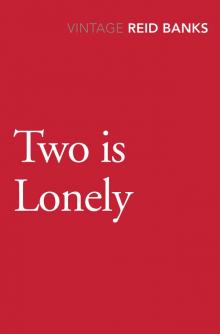 Two Is Lonely
Two Is Lonely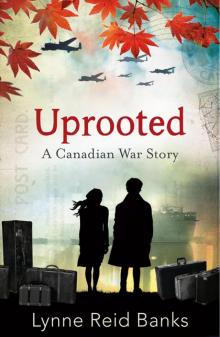 Uprooted - a Canadian War Story
Uprooted - a Canadian War Story The Backward Shadow
The Backward Shadow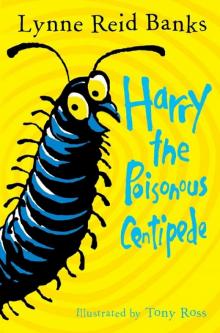 Harry the Poisonous Centipede: A Story to Make You Squirm
Harry the Poisonous Centipede: A Story to Make You Squirm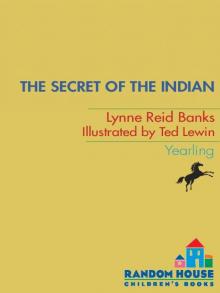 The Secret of the Indian (The Indian in the Cupboard)
The Secret of the Indian (The Indian in the Cupboard)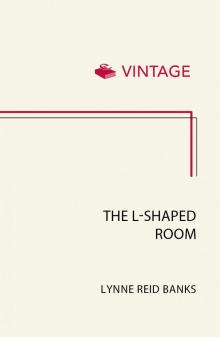 The L-Shaped Room
The L-Shaped Room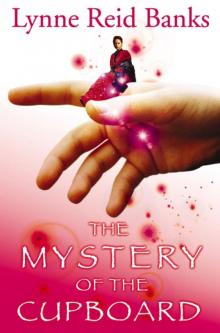 The Mystery of the Cupboard
The Mystery of the Cupboard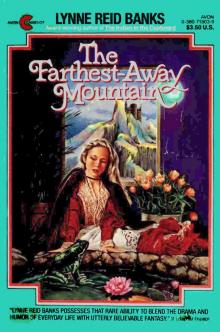 The Farthest-Away Mountain
The Farthest-Away Mountain Harry the Poisonous Centipede Goes to Sea
Harry the Poisonous Centipede Goes to Sea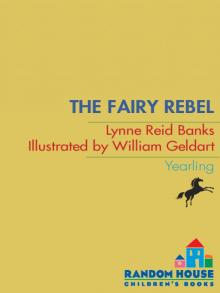 The Fairy Rebel
The Fairy Rebel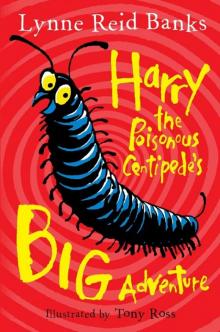 Harry the Poisonous Centipede's Big Adventure: Another Story to Make You Squirm
Harry the Poisonous Centipede's Big Adventure: Another Story to Make You Squirm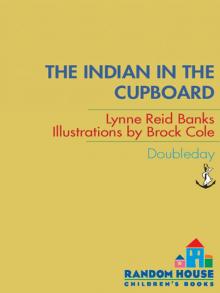 The Indian in the Cupboard
The Indian in the Cupboard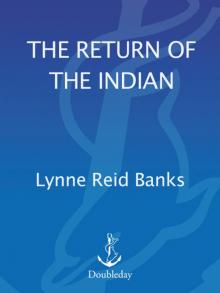 The Return of the Indian
The Return of the Indian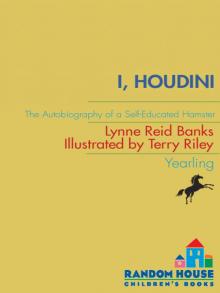 I, Houdini
I, Houdini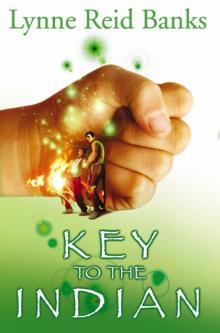 The Key to the Indian
The Key to the Indian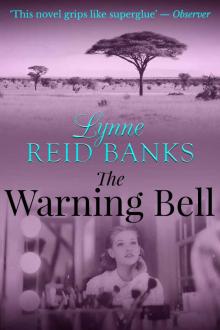 The Warning Bell
The Warning Bell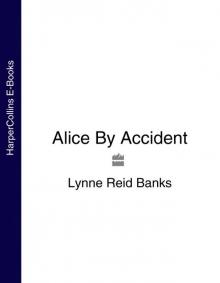 Alice by Accident
Alice by Accident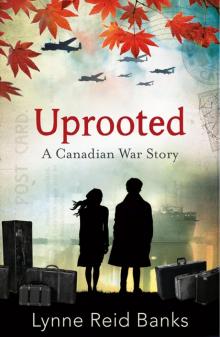 Uprooted
Uprooted Writing On the Wall
Writing On the Wall The Adventures of King Midas (Red Storybook)
The Adventures of King Midas (Red Storybook)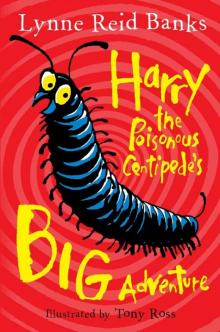 Harry the Poisonous Centipede's Big Adventure
Harry the Poisonous Centipede's Big Adventure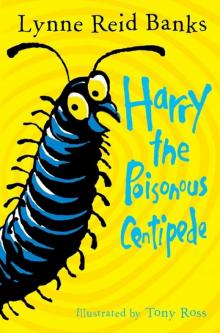 Harry the Poisonous Centipede
Harry the Poisonous Centipede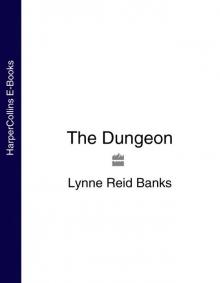 The Dungeon
The Dungeon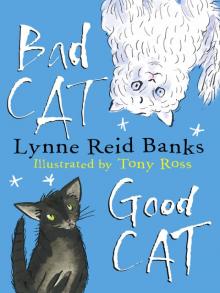 Bad Cat, Good Cat
Bad Cat, Good Cat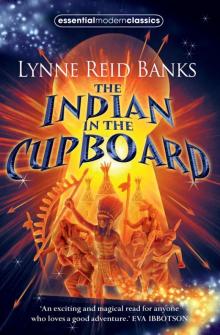 The Indian in the Cupboard (Essential Modern Classics, Book 1)
The Indian in the Cupboard (Essential Modern Classics, Book 1)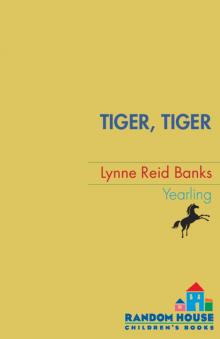 Tiger, Tiger
Tiger, Tiger